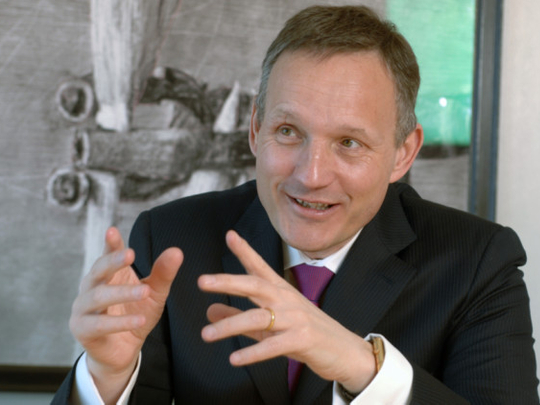
London: Barclay’s new chief executive officer Antony Jenkins is the opposite of his ex-boss, a marathon-running retail banker known as quiet and understated in comparison to Robert Diamond’s brash investment-banking style.
Jenkins, 51, takes over at Barclays after the bank paid a record fine for interest-rate manipulation, which led to the resignation of Diamond, Chairman Marcus Agius and former chief operating officer Jerry Del Missier. In a break with the past, he is the only CEO of a global, universal bank who doesn’t have a background in investment banking. He got the job after Barclays struggled to find other suitable candidates, said Paul Myners, the UK financial-services minister from 2008 to 2010.
“In Jenkins you’ve got the archetypal English CEO who is seen as rather safe, compared with the typically aggressive US investment banker that was Bob Diamond,” said Alan Beaney, who helps manage £200 million (Dh1.15 billion), including Barclays shares, at RC Brown Investment Management in Bristol, England. “His appointment signals that the bank is not going to be as brazen as it has been in the past.”
Diamond, 61, who became a symbol for excess in the banking industry after taking home about £120 million in compensation since joining the board in 2005, built Barclays’s investment bank and counts Rolling Stones singer Mick Jagger and golfer Phil Mickelson among his friends. By contrast Jenkins is known as a low-key collegial consumer banker, a long-distance runner who outlasted rivals to win the top job. His mantra is “relentless simplification.”
‘Transformational leader’
Jenkins must rebuild trust with regulators while convincing investors that he can maintain profitability in the glare of more intrusive regulation and political oversight.
“I’m a transformational leader, and I have every confidence that my business acumen, general experience in banking and the skills and talents of the team we have in the investment bank will enable me to continue to take Barclays” in the right direction, Jenkins said in an interview yesterday. “There are many fine things about Barclays.”
Jenkins, who studied philosophy, politics and economics at Oxford University, has been head of retail banking at Barclays since November 2009 after being promoted from CEO of Barclaycard, the bank’s credit-card division, which he joined in 2006. Born in Stoke-on-Trent, a city in the north of England, Jenkins joined Barclays in 1983 straight out of university before moving to Citigroup Inc. in 1989, where he was an executive vice president in the credit card division.
Boosted profits
He was recruited back to Barclays by then CEO John Varley in 2006 and became the top internal candidate after avoiding a series of scandals and strategic mistakes that undermined his colleagues for the top job. He was one of only a few senior UK bankers in Diamond’s team dominated by North Americans.
While head of Barclaycard, Jenkins boosted pretax profits to £727 million in 2009 from £522 million in 2006, according to filings. Pretax profit at the UK consumer-banking unit rose to £1 billion from £710 million in 2009. The two divisions are the only ones that met the bank’s 13 per cent return-on-equity target in 2011.
“You don’t have to raise your voice or thump the table to get your point across,” Jenkins said in an interview with the Telegraph in 2009. “When you have a very measured style, you don’t need to shout. You just need to make your point a little more directly and people notice.”
Consumer banking
After taking charge of Barclaycard in 2006, Jenkins replaced several senior employees at the credit-card division and sold Monument, the company’s subprime-lending unit, helping to improve the quality of loans. He took advantage of the impending credit crisis of 2008 by purchasing Goldfish, a credit card firm with 1.7 million customers and $4 billion in loans outstanding.
Barclays consumer-banking unit accounted for 49 per cent of adjusted profit before tax for the group last year, up from 35 per cent in the previous year. The investment-banking unit contributed 46 per cent of group profits in 2011 compared with 62 per cent in 2010.
“We view Jenkins as the natural internal choice for the position,” Jason Napier and David Lock, Deutsche Bank AG analysts, said in a note to clients on Friday. “He is well known to the market, businesses under his care have performed well, he possesses experience within and without the group, and his reputation and retail heritage provide a base for rebuilding the bank’s reputation.”
Marathon man
Jenkins comes from working-class roots. Neither of his parents went to university and his father worked two jobs as a salesman for a US abrasives firm and in a gas station. He attended a state school in Cheshire before going to Oxford.
He ran the New York marathon in 2005 in 4 hours and 49 minutes, improving on his 2003 time of 5 hours and 3 minutes. He raised money for the Sense charity, which supports deaf and blind people, for London’s 2010 marathon.
As CEO, he will earn as much as £8.6 million a year in salary, bonuses and pension payments, less than Diamond’s £12.5 million per year in pay and other benefits.
In July, bookmaker Paddy Power had him as the favourite, followed by Finance Director Chris Lucas, former consumer banking head Frits Seegers and Rich Ricci, who runs the investment bank.
Since then Lucas has come under investigation by the Financial Services Authority relating to the fees Barclays paid in 2008 to Qatar’s sovereign wealth fund, while Ricci was tarnished by his close association to Diamond.
“There actually were not many candidates for the role,” Myners said in an interview with Bloomberg Television. There were “probably less than four credible candidates, two of whom I know were approached and turned it down almost without any serious consideration,” he said, declining to identify them.
Investment banking
Just because Jenkins has a different background than Diamond, it is unlikely Barclays will ditch the universal banking model, Sandy Chen, an analyst at Cenkos Securities Plc in London, said in an interview on Bloomberg Television.
Jenkins has said in the past that the universal banking model, which incorporates investment and consumer banking within one firm, is the safest way to run a bank.
“The universal banking model as operated by Barclays is an inherently more solid proposition from a risk point of view,” Jenkins said at a hearing of the UK government’s Future of Banking Commission in March 2010. “A well-run universal banking model is a sound banking model.”












